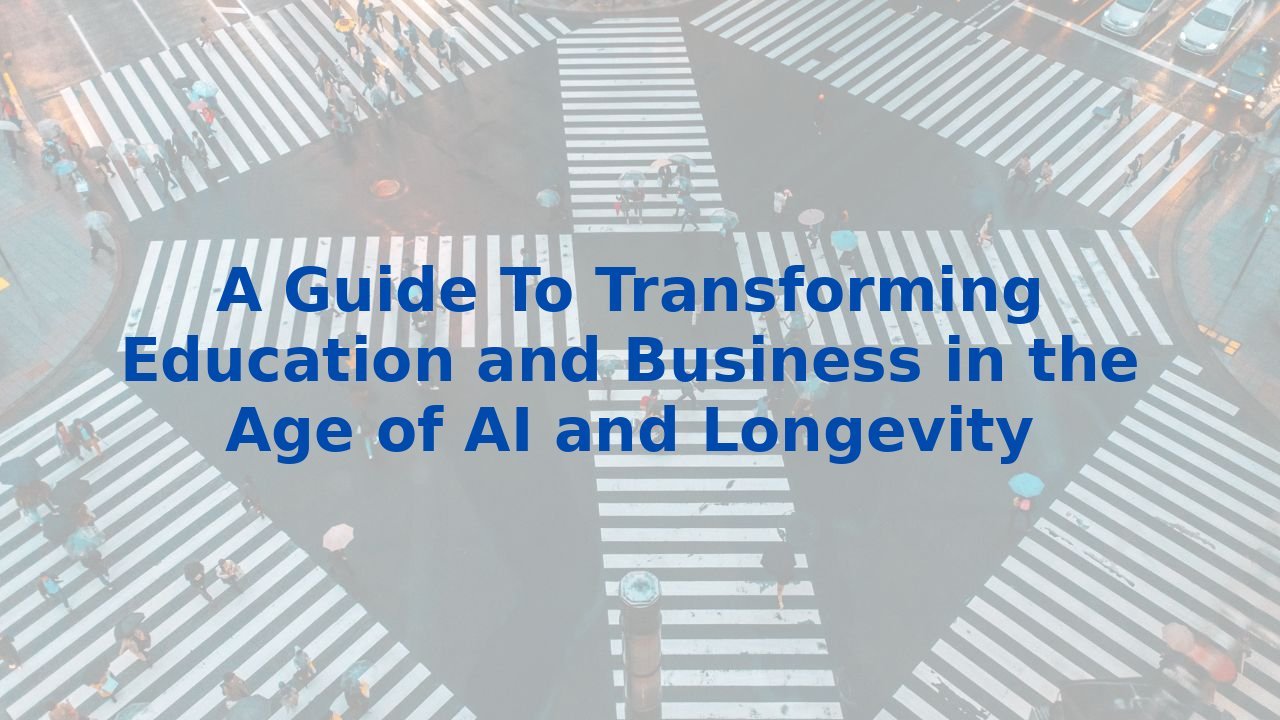A Guide To Transforming Education and Business in the Age of AI and Longevity
A Guide To Transforming Education and Business in the Age of AI and Longevity
As we navigate the modern landscape of business and education, two revolutionary forces are at play: artificial intelligence (AI) and the principles of longevity. These entities are reshaping how we approach organizational efficiency, employee progression, and customer interactions. In this guide, we'll explore how integrating AI can enhance traditional business processes and offer training solutions to keep employees ahead in this dynamic environment.
1. Automation: Elevating the Workforce
The most prominent way AI transforms business operations is through automating repetitive tasks. This shift allows employees to divert their focus from mundane activities to more value-adding endeavors. Consider the example of an HR department. AI-driven solutions like chatbots can handle routine inquiries, providing instant assistance to employees seeking information about policies, benefits, or schedules. This automation means that HR professionals can devote their time to strategic planning, talent development, and enhancing workplace culture.
Similarly, in sales and customer service, AI chatbots interact with customers to handle inquiries, guiding them through their purchasing journey seamlessly. This not only boosts customer satisfaction but also enables human representatives to engage with clients on more complex issues that require nuanced understanding and empathy.
2. Optimizing Decision-Making with Data Insights
In a world rich with data, AI shines by providing powerful insights that inform decision-making processes. Its capacity to analyze vast data sets quickly ensures that leaders make timely, informed choices that resonate with the market's pulse. They can predict demand fluctuations, optimize resource allocation, and preempt supply chain disruptions. For businesses, this means a proactive strategy that keeps them ahead of competitors, often transforming potential challenges into opportunities for growth.
For instance, retailers can leverage AI to sift through customer transaction histories, identifying purchasing patterns that enable personalized marketing efforts. These tailored approaches enhance customer experience through curated recommendations and targeted advertising, ultimately driving sales and loyalty.
3. Transforming Customer Experiences
As digital natives continue to demand personalization, AI provides businesses with the tools to meet these expectations. From personalized recommendations to instant messaging, AI technologies create a more interactive and engaging customer journey. It facilitates content generation for social media, blog posts, and advertisements, ensuring consistent communication that resonates with target audiences.
The capacity of AI-powered chatbots to deliver immediate responses further elevates customer interactions, ensuring satisfaction in real-time. Picture a customer exploring options late at night. An AI solution can deliver support without delay, providing a seamless experience that reflects positively on the brand.
4. Streamlining Operations for Longevity
In addition to its observable customer benefits, AI offers substantial operational efficiency improvements. It can significantly diminish costs associated with administrative tasks like data entry, meeting scheduling, and customer follow-up emails. These repetitive functions, often prone to human error, can be efficiently managed by AI, freeing up employees to engage in strategic initiatives and creative problem-solving.
Take manufacturing, for instance. AI's predictive capabilities enable businesses to foresee maintenance needs, thus averting costly equipment failures and downtime. This proactive methodology ensures smoother operations and cultivates longevity in business processes.
The Importance of Employee Training in AI
The integration of AI technologies into business practices not only brings forth operational enhancements but necessitates a new approach to workforce training. While AI can automate numerous tasks, it's crucial that employees learn to collaborate with these intelligent systems. Training employees to adeptly use these tools leads to several significant benefits:
- Upskilling: Equipping employees with AI competencies bolsters their career growth and increases workplace versatility.
- Adaptability: In an era where technology evolves rapidly, having a team that is proactive and adaptable ensures your organization remains competitive.
- Human-AI Collaboration: Educated staff members can work efficiently with AI systems, thus achieving a harmonious balance between human insight and machine efficiency.
By investing in comprehensive AI training programs, businesses build an adaptive workforce ready to leverage AI's full potential. Consider exploring training solutions that cater to diverse roles and skill levels in your organization, enhancing collaboration and overall performance.
Conclusion
The integration of AI into business and education marks a pivotal evolution in how we operate. By automating mundane tasks, optimizing decision-making, and enhancing customer experiences, AI is crafting a pathway toward increased efficiency and innovation. Investing in training not only secures a competitive edge but also equips employees to thrive alongside these advanced technologies. In this age of AI and longevity, the only limitation to our potential is our willingness to embrace change and foster growth.
For businesses seeking to deepen their understanding and implementation of AI, exploring available training resources can catalyze your organization’s journey into the future. Each step taken today paves the way for a more efficient and transformative tomorrow.



